🩸💊🛡️ Dabigatran Etexilate 75mg Tablet: A Modern Oral Anticoagulant for Stroke & Clot Prevention
Dabigatran Etexilate 75mg is an oral anticoagulant (blood thinner) belonging to a class known as direct thrombin inhibitors. It is commonly prescribed for the prevention and treatment of blood clots, particularly in patients with non-valvular atrial fibrillation (NVAF), deep vein thrombosis (DVT), and pulmonary embolism (PE). It is also used to prevent stroke in high-risk individuals. This lower-dose (75mg) formulation is especially important for patients with moderate renal impairment or other conditions requiring dose adjustment.
🔬 Mechanism of Action
Dabigatran Etexilate is a prodrug that, once ingested, is converted into dabigatran, its active form. Dabigatran works by directly inhibiting thrombin (Factor IIa), a key enzyme in the blood coagulation cascade. Thrombin converts fibrinogen to fibrin, leading to clot formation. By blocking thrombin:
-
It prevents clot formation
-
Reduces the risk of stroke and systemic embolism
-
Helps breakdown existing clots in the treatment phase
This targeted mechanism gives Dabigatran a predictable anticoagulant effect, reducing the need for routine blood monitoring (unlike warfarin).
📌 Indications and Uses
Dabigatran 75mg is indicated for:
-
Prevention of stroke and systemic embolism in patients with non-valvular atrial fibrillation (NVAF)
-
Treatment of DVT and PE
-
Prevention of recurrent DVT and PE
-
Postoperative thromboprophylaxis after hip or knee replacement surgery
The 75mg dose is commonly used in:
-
Patients with renal impairment (creatinine clearance 30–50 mL/min)
-
Patients at higher risk of bleeding
-
As a modified dose in dual antiplatelet therapy
💊 Dosage and Administration
-
Typically taken twice daily with or without food
-
Swallow whole, do not crush or chew the capsule, as this can increase bleeding risk
-
Dose adjustments are based on renal function, age, and co-medications
In some cases, Dabigatran 75mg may be combined with aspirin or clopidogrel, but this increases bleeding risk and must be monitored carefully.
⚠️ Precautions and Warnings
-
Not recommended in patients with severe renal impairment (CrCl <30 mL/min)
-
Use with caution in elderly patients, and those with bleeding disorders
-
Avoid use in patients with mechanical heart valves
-
Discontinue before surgeries or invasive procedures (timing depends on renal function)
There is a specific reversal agent available: Idarucizumab, used in emergencies to counteract Dabigatran’s effects.
🤒 Side Effects
Common:
-
Gastritis-like symptoms (indigestion, stomach pain)
-
Nausea
-
Minor bleeding (gums, nosebleeds, bruising)
Serious:
-
Major bleeding (GI bleeding, brain hemorrhage)
-
Allergic reactions (rash, swelling, difficulty breathing)
Seek medical help immediately for signs of internal bleeding or severe allergic reactions.
🔄 Drug Interactions
-
Avoid with P-glycoprotein inhibitors (e.g., amiodarone, verapamil, ketoconazole) unless under supervision
-
Increased bleeding risk with NSAIDs, antiplatelets, SSRIs, and other anticoagulants
Routine INR monitoring is not required, but renal function should be monitored periodically.
🧊 Storage Instructions
-
Store in original blister packaging to protect from moisture
-
Keep at room temperature, away from heat and direct sunlight
-
Do not transfer capsules to another container
📝 Conclusion
Dabigatran Etexilate 75mg is a reliable, targeted oral anticoagulant that offers effective stroke prevention and clot treatment with minimal monitoring. Its lower dose provides a safer option for renal-impaired or elderly patients, with the convenience of oral dosing and a specific reversal agent in case of emergency.
Always follow your doctor’s advice, dosage instructions, and never self-medicate.
Note: This information is intended for educational purposes and should not replace professional medical advice. Always consult your healthcare provider for personalized recommendations.
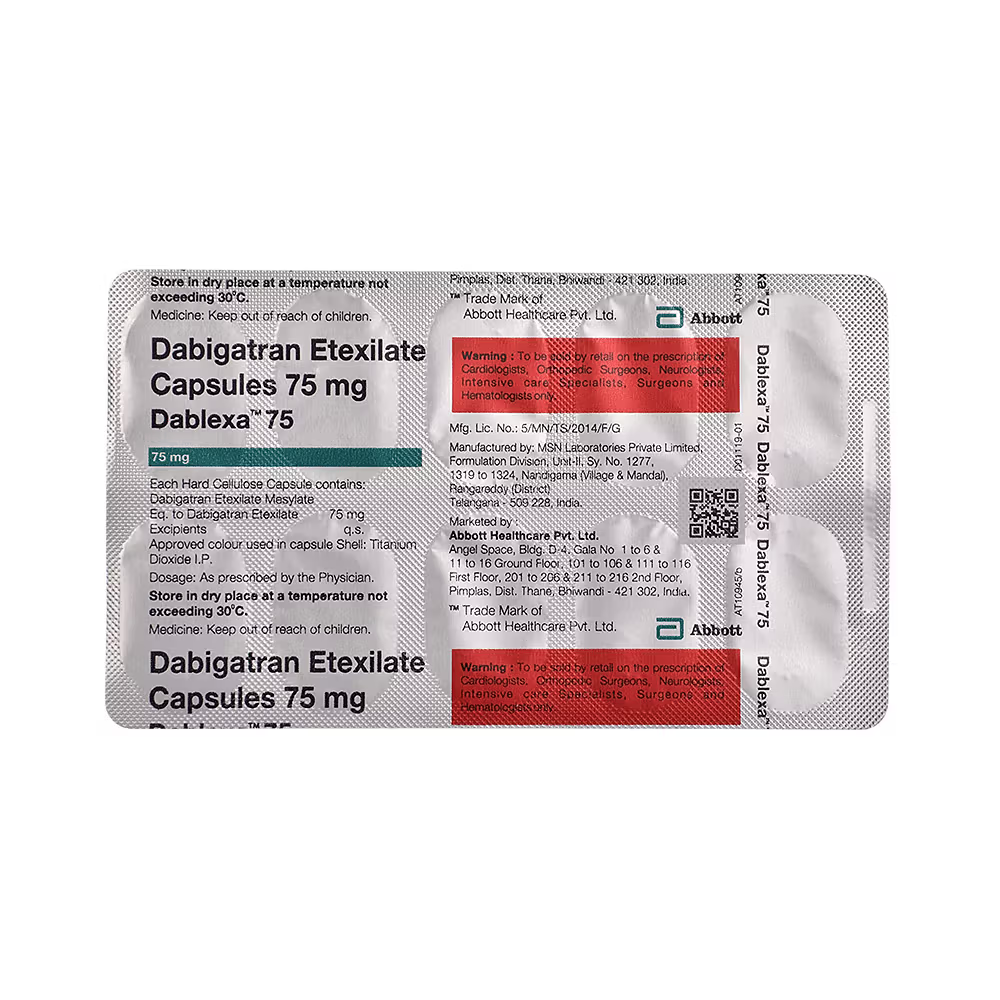
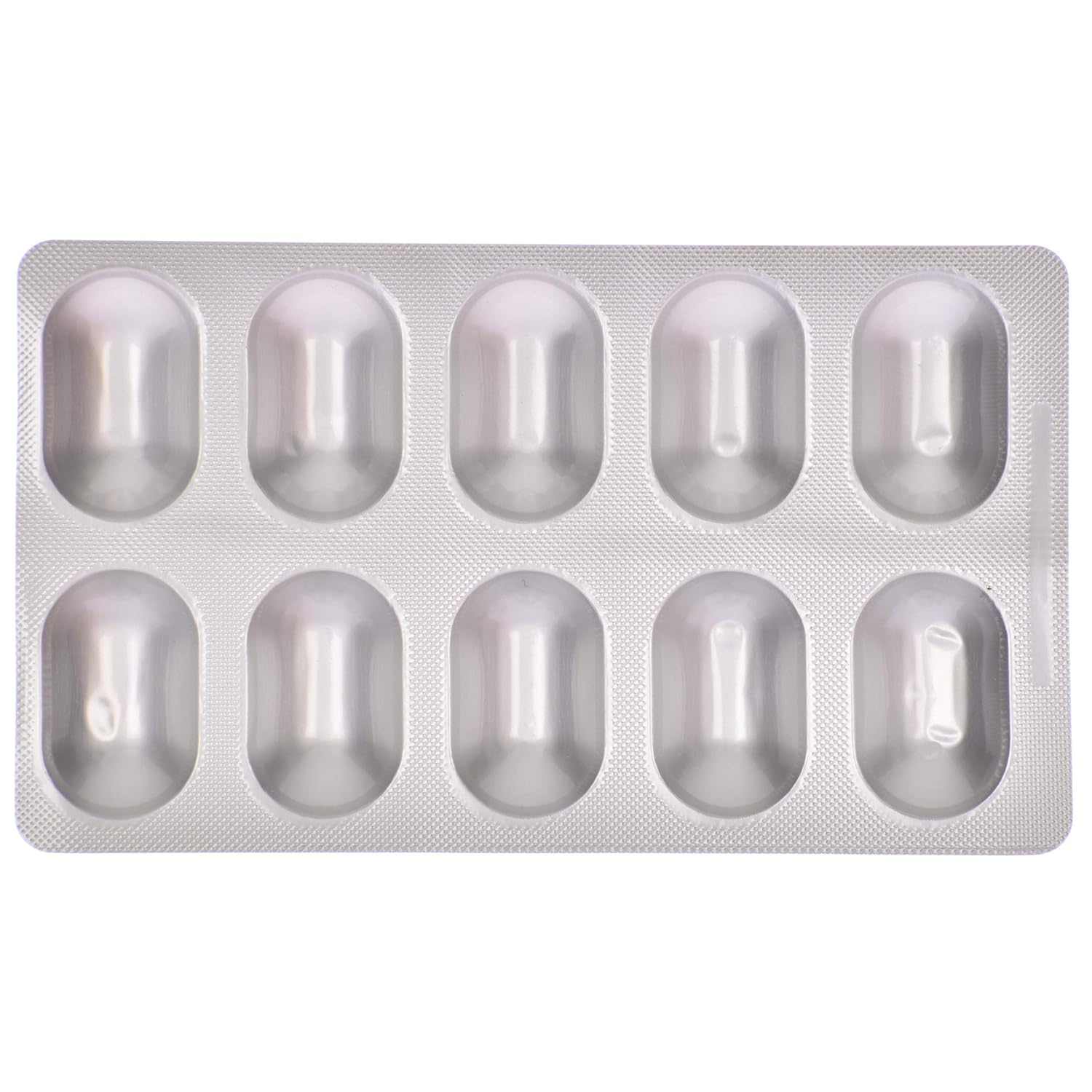
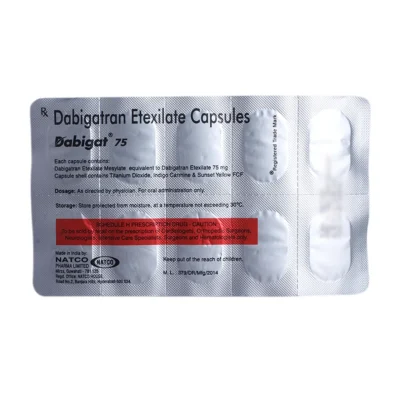
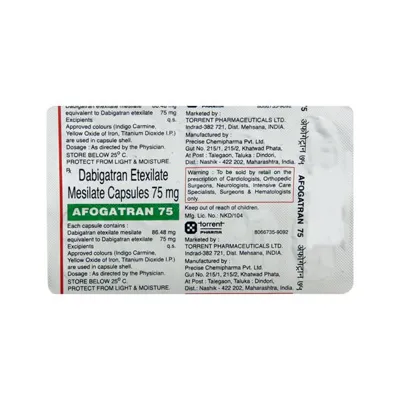
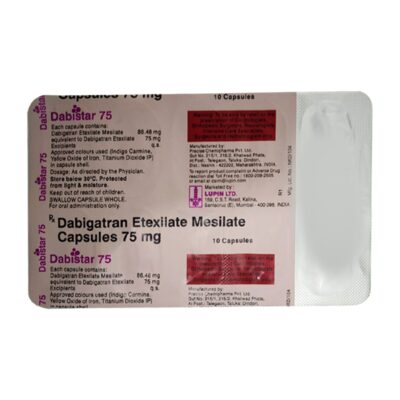

Reviews
There are no reviews yet.